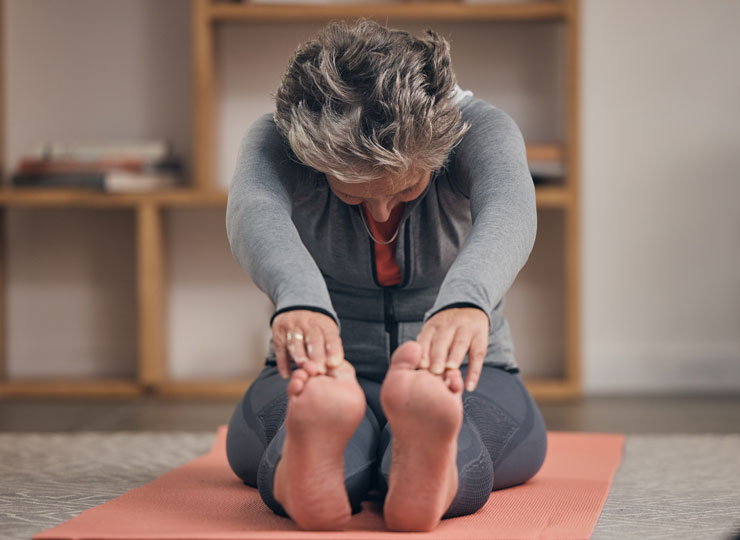Can Yoga Be Beneficial in Alzheimer’s? Examining the stats

Yes, yoga can be beneficial for people with Alzheimer’s disease. Studies have shown that it improves cognitive function, memory, and emotional health, as well as reduces anxiety and depression. The combination of yoga postures, breathing techniques (pranayama), and meditation can enhance neuroplasticity, improve attention and information processing, and provide a calming effect. For individuals with dementia, chair yoga or other accessible adaptations may be especially helpful in improving physical condition, mood, and overall quality of life. Dementia can affect a person’s ability to make decisions or remember people and events that happened recently or in the past. It can cause difficulty with things like moving, speaking, or expressing themselves, which affects their conversations and behavior.
Alzheimer’s disease is a progressive brain condition that destroys memory and thinking skills, eventually resulting in the inability to perform daily tasks, and is the most common cause of dementia. It is characterized by abnormal protein deposits called amyloid plaques and tau tangles in the brain, which lead to the death of brain cells. Symptoms include memory loss, confusion, difficulty making decisions, and personality and behavior changes, and the disease goes through different stages. Although there is no cure, treatments focus on controlling symptoms and improving quality of life, taking into account risk factors such as older age and family history.
If you have anyone in your family with Alzheimer’s, yoga and meditation are one of the best lifestyle changes that can improve your cognitive function, further reducing your chances of suffering from this problem. Yoga teacher training in rishikesh is one of the best ways to introduce and have a long-term, sustainable change in your daily life. learning from the best teachers with both traditional and scientific approaches, this can be one of the best options for learning as well as enjoying a vacation, as the currency exchange rate is very good. You can easily afford the course and explore the streets of rishikesh.
What the stats say:
A study from UCLA Health found that Kundalini yoga provided unique benefits for older women at risk for Alzheimer’s, including restoring neural pathways and reducing aging-related biomarkers, which were not achieved by traditional memory training exercises.
A study published in the International Journal of Environmental Research and Public Health concluded that yoga is a safe and effective intervention for improving cognitive function in older adults.
Another study found that a 12-week yoga intervention significantly improved cognitive function and quality of life in Alzheimer’s patients, as measured by the Mini-Cog Assessment (MoCA) and the Geriatric Depression Scale (GDS).
Research on Kirtan Kriya (KK), a specific meditative yoga practice, has shown improvements in memory, attention, and brain connectivity.
To know more about the 200 hour yoga teacher training in Rishikesh, click on the link and get all the details regarding the course.
Cognitive benefits
Improved memory:
Yoga and meditation have been shown to improve memory recall, particularly in terms of verbal memory and delayed recall.
Improved attention and concentration:
This practice can lead to better concentration and information-processing abilities.
Improved neuroplasticity:
Practicing yoga stimulates neuroplasticity, which helps the brain’s ability to form new connections and adapt.
Executive function:
Yoga can have a positive effect on executive function, which involves high-level mental processes such as planning and decision-making.
Emotional and mental health
Reduced anxiety and depression:
Yoga has a calming effect that helps reduce symptoms of anxiety and depression, leading to better coping abilities.
Improved mood and emotional stability:
Studies show that people with Alzheimer’s who practice yoga have a significant improvement in their mood and emotional state.
Enhanced quality of life:
By addressing cognitive, emotional, and physical challenges, yoga contributes to a better overall quality of life for patients.
Physical and holistic benefits
Better sleep: Yoga may contribute to better sleep patterns, which are often disrupted in individuals with Alzheimer’s.
Physical health: The practice may improve flexibility, mobility, posture, and balance.
Holistic approach: Yoga offers a comprehensive approach by simultaneously addressing physical impairment, cognitive decline, and emotional problems.
How to start your journey
1. Find a qualified instructor:
Look for an experienced yoga instructor who knows how to adapt a yoga practice for individuals with dementia and Alzheimer’s.
2. Begin with gentle exercises:
Begin by practicing calming yoga postures and breathing exercises.
3. Focus on breathing and mindfulness:
Incorporate breathing awareness exercises to help you stay connected to body and mind.
4. Create a comfortable environment:
Choose a quiet, familiar place to practice, where distractions are kept to a minimum to improve focus and reduce confusion.
5. Incorporate soothing elements:
Pair yoga sessions with soothing music or rhythmic movements to make the practice more enjoyable and engaging.
6. Practice with a caregiver:
If possible, include a caregiver with the person with Alzheimer’s so he or she can provide support and share the benefits.
7. Give clear instructions:
Use clear and easy-to-understand instructions to prevent participants from getting confused.
8. Incorporate yoga into a daily routine:
Incorporate yoga into a daily routine to provide stability and relaxation.
The best exercise for Alzheimer’s is a combination of aerobic activity (such as walking), strength training, balance and flexibility exercises (such as yoga), and social engagement. Regularly engaging in these activities can improve cognitive function, heart health, muscle strength, and sleep, as well as reduce the risk of getting Alzheimer’s or slow its progression. Keep familiar items in the home, like family photos and mementos. They might feel more secure and connected as a result of these. Familiar smells and entertainment are also comforting.
